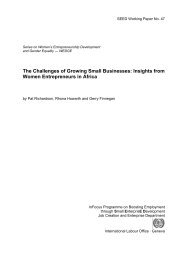Social and Solidarity Economy: Our common road towards Decent ...
Social and Solidarity Economy: Our common road towards Decent ...
Social and Solidarity Economy: Our common road towards Decent ...
You also want an ePaper? Increase the reach of your titles
YUMPU automatically turns print PDFs into web optimized ePapers that Google loves.
SOCIAL AND SOLIDARITY ECONOMY ACADEMY<br />
The ILO Regional Conference on social economy (Johannesburg, 19-21 October 2009)<br />
Over 200 social economy promoters <strong>and</strong> stakeholders from Africa, government representatives from 25<br />
African countries, employers’ <strong>and</strong> workers’ organizations, SSEOs from other parts of the world <strong>and</strong> ILO<br />
headquarters units <strong>and</strong> field specialists attended the conference. They adopted a Plan of Action aiming<br />
at mobilizing the SSE in Africa in response to the crisis, at local, national <strong>and</strong> regional levels.<br />
In addition to leading to a tripartite consensus on an inclusive definition of the SSE, participants made<br />
several contributions in the Plan of Action; such as:<br />
the recognition of the role of the SSE <strong>and</strong> its enterprises <strong>and</strong> organizations in African society, <strong>and</strong> their<br />
role in responding to the multifaceted crisis affecting African countries <strong>and</strong> their people;<br />
the conviction that the SSE provides complementary paths to development, which bring together in a<br />
coherent manner the concerns of economic sustainability, social justice, ecological balance, political<br />
stability, conflict resolution <strong>and</strong> gender equality;<br />
the acknowledgement of the contribution of SSEOs in meeting women’s <strong>and</strong> men’s needs <strong>and</strong><br />
aspirations, contributing to the <strong>Decent</strong> Work Agenda, enhancing voice <strong>and</strong> representation <strong>and</strong><br />
addressing the food crisis, the HIV/AIDS p<strong>and</strong>emic <strong>and</strong> environmental challenges.<br />
In 2010, the ILO International Training Centre (ITC) launched the first Interregional Academy on <strong>Social</strong> <strong>and</strong><br />
<strong>Solidarity</strong> <strong>Economy</strong>, which was a decisive step <strong>towards</strong> building a global consensus on the key characteristics<br />
<strong>and</strong> universal principles of the SSE <strong>and</strong> its organizations <strong>and</strong> enterprises. This first edition of the Academy was<br />
organized in partnership with the European Economic <strong>and</strong> <strong>Social</strong> Committee (EESC) <strong>and</strong> in collaboration with<br />
CIRIEC. The Academy gathered about 67 policy-makers <strong>and</strong> practitioners (i.e. 27 women <strong>and</strong> 40 men) from 43<br />
different countries. The participants came from various institutions: about 30 per cent came from<br />
government/public institutions, 14 per cent from social partners organizations, 12 per cent from<br />
non-governmental organizations (NGOs) <strong>and</strong> 17 per cent from academic institutions. The other participants<br />
came from the UN, other intergovernmental organizations <strong>and</strong> the private sector.<br />
The Academy was structured as a mix of theoretical plenary sessions <strong>and</strong> practical workshops. Participants in<br />
the 2010 Academy were familiar with the concept of the SSE. More than experiencing training, they enjoyed<br />
the opportunity to network <strong>and</strong> exchange their experiences <strong>and</strong> ideas. Using the first version of the Reader,<br />
participants of the 2010 Academy pointed out some issues that should be further explored in the 2011 edition<br />
of the Academy (e.g. informal sector, social protection, financing SSE, SSE <strong>and</strong> specific vulnerable groups like<br />
people with disabilities, those living with HIV, prisoners <strong>and</strong> migrants) <strong>and</strong> suggested additional topics (e.g.<br />
green jobs, local economic development, supporting social enterprises) that should be included in the next<br />
version of the Reader.<br />
Participants also were very concerned by the need for global recognition of the SSE as a niche situated<br />
between the public <strong>and</strong> the private sectors. The SSE is not meant to replace the private sector, but to offer<br />
complementary solutions <strong>and</strong> innovative practices. The ILO has a role to play in achieving such recognition,<br />
e.g. by proposing a definition that could be endorsed through a tripartite process. Participants insist that the<br />
ILO should keep playing a leading <strong>and</strong> pioneering role in advocating the SSE among its constituents,<br />
development partners <strong>and</strong> throughout the UN system.<br />
viii<br />
READER

















